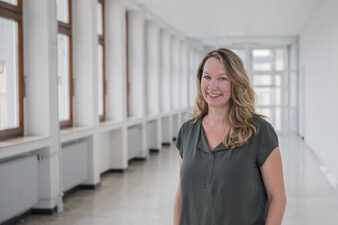About the project
A research information system for Dortmund University of Applied Sciences and Arts
Research information includes information on research activities and the framework conditions under which they are carried out. This includes, for example, information on researchers, publications or projects.
The research information system HISinOne-RES is now intended to bring together the distributed information from administration and science, taking into account the core data set for research, in order to provide a structured view of research activities and the associated information.
The research core data set
In January 2016, the German Council of Science and Humanities published the Core Data Set for Research (KDSF) as a recommendation to create a standardized basis for comparing reports from research institutions.
The Core Data Set Research is a "proposal to provide some clearly described information on research activities and the framework conditions under which they are carried out in standardized data formats." (German Council of Science and Humanities, Recommendations for the specification of the Core Data Set Research, 22.01.2016)."
The KDFS is formed from aggregate data from the following six areas
- Employees
- Promotion of early career researchers
- Third-party funding and finances
- Patents and spin-offs
- Publications
- Research infrastructures
Project goals
The introduction of the system will create administrative relief on the scientific and administrative side, as it brings together information from the various systems, replaces current isolated solutions and manual list management in some areas and further digitizes work processes. The information that will then be available can be used both for external presentation (linked to our website), as well as for reporting obligations and possibly for controlling work processes.
Project organization
The Rectorate of the University of Applied Sciences is the project client and at the same time the highest decision-making body.
The steering committee is a high-caliber body with a large number of members. This is due to the fact that the FIS project has an impact on almost all areas of the University of Applied Sciences and is intended to bring together information from a wide variety of systems. This is to ensure that all interests are taken into account and that every area can benefit from the introduction of a research information system.
The project management team is responsible for monitoring the project, while the project coordination team is responsible for concrete control and planning. They are therefore also the first point of contact for project-related issues and questions.
The project team is also relatively large, as at least one person from each area from which the KDSF provides information should contribute their technical expertise. Depending on the project phase, further sub-project teams are then formed, which also provide the respective system and/or data experts.
CRIS.NRW - a strong partner at our side
The project is being implemented together with the state initiative CRIS.NRW. This initiative offers universities in North Rhine-Westphalia an all-round service for the topics of core data set research and research information system.
CRIS.NRW not only provides guidelines and instructions for implementation, but also promotes exchange between the universities in NRW. The creation of such a network results in various advantages for the universities in the following areas
- Implementation (everyone benefits from the experience of others)
- Financing (favorable conditions for network members)
- Operation (provision/maintenance/security by CRIS.NRW, support can be shared)
All this saves time and resources and enables us to realize and implement the HISinOne-RES research information system relatively quickly. As one of the first universities of applied sciences in NRW, we are planning a go-live in the summer of 2022!
Project time frame
In preparation for the project, the Fachhochschule Dortmund (as one of the first universities in North Rhine-Westphalia) began recording the current status in August 2017 as part of FIS Readiness - with significant participation from CRIS.NRW. The corresponding final report was presented at the university at the end of 2017.
After the introductory project was launched at three pilot universities in NRW together with CRIS.NRW in 2018/19, our university also resumed preparations for the project at the end of 2019. In 2020, the FIS readiness phase was completed with a further focus on defining the objectives and setting up the organization so that the project "Introduction of the HISinOne-RES research information system" could start in October 2020.
A go-live is planned for 2023.
Contact & Team
If you have any questions about the project, please do not hesitate to contact us using the following contact details:
Tanja Surdyk, Dipl.-Des.
- +49 231 91129145
Mon.-Thurs.
09:00 -14:00


